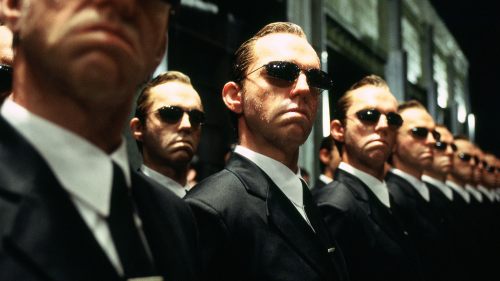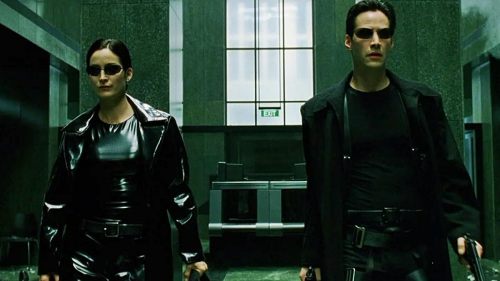The Badass Hall of Fame: The Wachowskis
The next generation of film nerds will look back at this time and be in awe of the fact that we lived through the Wachowskis’ active filmmaking period. They’re going to wonder what it was like to go to the movies every couple of years and experience this duo pushing the boundaries, going big without a safety net, being unafraid of failing. And, sometimes, failing big.
But when they succeed, they succeed in cinema-shaking ways. The Matrix is a movie whose impact is as big, as deep and as epochal as Star Wars. You can look at big budget genre films as pre-Matrix and post-Matrix. The aesthetics and visual language of action filmmaking had been evolving through the 90s, but it was The Matrix that truly solidified a new direction, not only in visuals but in the ways that genre films approached thematic meaning. Suddenly not every action movie had to be dumb fun.
Where some modern filmmakers pay lip service to being a nerd (“I read a comic this one time!”), the Wachowskis were the true blue thing. Growing up in the Illinois suburbs they didn’t just read comics, they wrote and drew them. They didn’t just play D&D, they wrote their own game system. Like the truest, best nerds the Wachowskis didn’t just play in other people’s worlds, they made their own. And they made them together. The two were inseparable and, in their earliest years, forged a creative collaboration that would make them a team that directs films as if they have one mind.
The Matrix is like a singularity whose massive gravity distorts everything around it, especially the Wachowskis’ career. The two sequels were a mixed bag - I still believe The Matrix Reloaded is an extraordinary film that expands the first movie’s philosophical concepts to mind-boggling levels, while The Matrix Revolutions is a miss that comes together for a truly sublime finale - but they were never able to be fairly judged because of the shadow of that first movie.
Still, it’s impossible to look at The Matrix Revolutions and not be stunned at the audacity on display. Doing Matrix sequels should have been simple, and by the numbers. We know how trilogies work. We know what’s expected of the finale. We know that good must triumph over evil. Sacrifices must be made, but in the end the heroes stand victorious, ready to fight the next battle. But Revolutions posits no next battle; it’s a film not about finishing a conflict but about finishing ALL conflict. It’s a film where the heroes try to find a way to live together with their enemies - a most non-action film concept.
The execution of that concept is, without a doubt, off, but for the last fifteen minutes of that film I was enthralled with where the Wachowskis were taking their story of rebellion and self-actualization.
Cinema is execution-dependent, though, and they executed the fuck out of their next film, Speed Racer. One of the most formally daring mainstream movies of all time, Speed Racer is a hallucinogenic headbutt to all preconceived concepts of cinematic editing and storytelling. The Wachowskis approach film as a strip, like a medieval tapestry that extends and continues without cuts or interruptions. Lana Wachowski has called it Cubist Cinema, but whatever you call it it’s a harbinger of the future, of a cinema that is in tune with the modern viewer’s ability to process information at incredible rates of speed.
More than that, Speed Racer is an incredibly autobiographical movie. This isn’t just a candy-colored explosion of special effects (although it is also that), it’s an examination of what it means to be an artist in a commercial world. Speed wants to win not because he loves winning but because winning allows him to do what he loves best: keep on driving. This is the Rosetta Stone to the Wachowskis; they want to work on big, expensive canvasses, but to do so they have to be financially successful. They have to win.
Now they find themselves in something of an underdog position. The goodwill of The Matrix is gone. Speed Racer is slowly being embraced as a visionary classic... but very slowly. Their first film, the lesbian crime thriller Bound, is well-regarded but considered minor (I suspect in ten years the conversation will change, and we’ll be talking about its place in queer cinema, especially in light of Larry Wachowski’s transformation into Lana). And their latest cultural impact - the Guy Fawkes mask from V For Vendetta, a film that has sparked the imagination of a generation of activists - is technically the work of another director (I’m interested in one day reading the true story behind the making of that film).
It’s as underdogs that they release Cloud Atlas, a film co-directed with Tom Tykwer. In a career marked by walking right up to the edge, this could be the film where they go the furthest. While not as visually experimental as Speed Racer, Cloud Atlas is a film that truly trusts in the audience’s ability to process lots of information. But perhaps where they’re pushing things farthest is in their embrace of emotion; The Matrix films are cold and philosophical, and while Speed Racer is, at its heart, a touching family story, it can be hard to get past the whizbang exterior to see that. But Cloud Atlas bleeds on the screen, as big hearted and open souled as any movie of the last decade. This naked emotion turns off some viewers, people who prefer the comfort of distance and irony. Those searching for a spiritual oasis in the desert of the real will find it in Cloud Atlas.
The Wachowskis are badasses in the most exciting ways. It would have been easy for them to course correct after Speed Racer, to make a movie that would appeal to the still-large fanbase of the original The Matrix. They didn’t. It would have been easy for them to pander by helming a superhero movie, which they’ve been offered on many occasions. They didn’t. It would have been easy for them to approach Cloud Atlas in a more conservative way, assuring themselves a cavalcade of Oscar nominations. They didn’t.
Over the years they’ve played the game their own way. They’ve stayed out of the spotlight, until now eschewing interviews and personal appearances. Unlike lesser talents they’ve avoided building a cult of personality, preferring to let the work speak for them. They’ve prized their privacy and anonymity.
Behind that privacy, though, are two people who should be role models for true nerds. Smart, big thinkers, the Wachowskis remain outsiders. Geeks have inherited the pop culture, and you can lay some of that at their feet, but they have not accepted coronation. They remain as iconoclastic and unique as they were as kids.
What’s more, the fact that a Lana Wachowski exists at all is badass in the extreme. Geek culture is rampantly homophobic and misogynistic, and yet Lana has stepped forward to bravely show that our gender-normative ideas don’t work in the 21st century. Her speech before the Human Rights Campaign recently is moving, and a reminder that as a subculture built on the idea of being outsiders, nerds have a moral duty to support those who are different and yet brave enough to live their lives in public.
Setting aside all of that, viewed simply as filmmakers, the Wachowskis are the sort of creative force we need. Their formal restlessness, their belief that audiences want big ideas, their willingness to try new things at every turn, this is all the stuff of cinematic legends.
Years from now future nerds will look back in awe at what the Wachowskis did. Let’s appreciate it now, while we’re living it.



